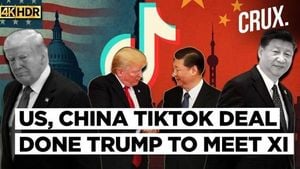Former Prime Minister Tony Blair’s fondness for music was no secret, but newly released official files provide a fascinating glimpse into how he handled some of the more unusual gifts he received while in office. Among these were guitars from rock legends and a tennis racket from a sporting goods manufacturer — each presenting unique dilemmas about protocol, personal use, and propriety.
On July 22, 2025, official documents released by the National Archives in Kew, west London, revealed that Mr. Blair was particularly keen to keep a guitar gifted to him by Bono, the U2 frontman and Live Aid campaigner. The files show that Blair was eager to take advantage of ministerial gift rules to acquire the instrument after leaving office, though he was not without reservations. He questioned whether he would have to pay “the full purchase price” for the guitar, highlighting the complexities surrounding gifts to public officials.
Under the rules governing ministerial gifts, Blair, who served as Prime Minister from 1997 to 2007, was allowed to accept gifts valued over £140 but was required to pay for them himself, minus the £140 difference. This framework was designed to prevent undue influence while allowing officials to keep mementos of their tenure. The guitar from Bono, therefore, was not simply a keepsake but a potential purchase under these regulations.
The Prime Minister’s musical background made this gift particularly meaningful. Blair, a noted music enthusiast, had fronted a rock band called Ugly Rumours during his student days at the University of Oxford. His passion for guitars was evident; in fact, he chose a guitar as his luxury item when he appeared on the BBC’s Desert Island Discs in 1996. This personal connection perhaps explains his enthusiasm for retaining the guitar from Bono.
Adding to the musical gifts, officials at No 10 also suggested that Blair might want to consider keeping a white Fender Stratocaster valued at £2,500, given by Canadian singer Bryan Adams. This suggestion was in line with the approach Blair took with the Bono guitar, potentially allowing him to acquire another prized instrument under the ministerial gift rules. The Stratocaster, a classic model beloved by many guitarists, would have been a fitting addition to Blair’s collection.
However, not all gifts were met with the same enthusiasm. Blair was notably less keen on an acoustic Vargas guitar presented to him by President Vicente Fox during an official visit to Mexico in 2001. The files reveal his candid assessment: “I don’t actually use it.” This statement underscores the practical considerations that come with accepting gifts — not every present, no matter how prestigious, fits the recipient’s interests or lifestyle.
The contrast between the two guitars highlights an intriguing aspect of Blair’s approach to gifts. While he embraced those that resonated with his personal passions, he was pragmatic about others. The Vargas guitar, despite its official provenance, did not inspire the same affection, illustrating the sometimes awkward intersection of diplomacy and personal taste.
Beyond musical instruments, the files also shed light on Blair’s handling of a Pro Braided tennis racket given to him by the manufacturer Slazenger. Officials expressed concern that accepting the racket might be perceived as endorsing a product, which could pose ethical issues. They suggested the racket be donated to a children’s charity to avoid any implication of favoritism or marketing ploys.
Yet Blair overruled this advice, instructing officials simply to thank the company. He remarked, “It is very churlish to refuse to use it,” indicating a more relaxed attitude toward such gifts. This decision reflects a balancing act between maintaining ethical standards and acknowledging the goodwill behind gifts from companies.
Blair’s handling of the Slazenger racket reveals a nuanced understanding of the optics involved in gift acceptance. While wary of appearing to endorse a product, he also recognized the importance of courtesy and the potential benefits of accepting such items without fanfare.
Interestingly, Blair’s relationship with guitars extended beyond personal collection. In 2000, rock legends Pete Townshend, David Bowie, and Mick Jagger purchased a 1957 Fender Stratocaster once owned by Eric Clapton in a charity auction and presented it to Blair. However, demonstrating his philanthropic spirit, Blair returned the guitar to be auctioned again to raise more funds for flood and drought victims in Africa. This act highlighted his commitment to leveraging his public profile for charitable causes.
These revelations provide a rare, behind-the-scenes look at the interplay between personal interests, official protocol, and public perception in the life of a former prime minister. Blair’s musical inclinations clearly influenced his decisions, but so did a pragmatic approach to the complexities of ministerial gifts.
They also illuminate the broader challenges faced by public figures when navigating the fine line between accepting tokens of appreciation and avoiding any suggestion of impropriety. The ministerial gift rules, while aiming to maintain transparency, require careful interpretation and application, as Blair’s experiences demonstrate.
Moreover, the files reveal a human side to Blair’s tenure, where personal tastes and official duties sometimes collided. His frank admission about not using the Vargas guitar and his insistence on accepting the tennis racket despite concerns show a man negotiating the realities of office with his own preferences and principles.
As these documents enter the public domain, they contribute to a richer understanding of Tony Blair’s premiership and personality. They remind us that even political leaders have personal quirks and passions that shape their decisions, sometimes in unexpected ways.
In the end, Blair’s story with these gifts is more than about guitars or tennis rackets; it’s about the human dimension of leadership, the symbolic weight of gifts, and the delicate dance of public service and private life.






